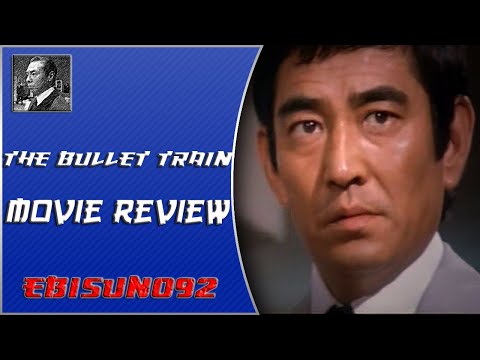
The Bullet Train (Japan, 1975) | Movie Review (Unaltered Version for AsianFilmFans)
Hello! I’m Oliver from Asian Film Fans.
In “Forgotten Gems” series, we discuss underrated
Asian movies that obviously deserve more love nowadays.
In this video, I’m going to discuss Junya
Sato’s movie from 1975 “The Bullet Train.”
Disaster films are a wonderful genre.
You get “race against time” plotline,
one dimensional heroes,
damsels (and children!) in distress,
a pretentious and a bit too loud music score,
but also massive destruction of biblical proportions,
providing that the budget was sufficient.
Needless to say, “The Bullet Train” delivers all of
these things and yet manages to surprise.
It is just another day on the
grand Tokyo Railway Station.
Passengers take their seats and
Shinkansen Express Hikari 109
to Hakata begins its swift and comfortable journey.
However, shortly after the train’s departure,
the security office receives a phone call.
A mysterious caller tells them that a bomb has
been planted on board of Hikari 109
and it will go off as soon as the
train slows down to 80 km/h.
In consequence, Shinkansen is riding
through Japan without the ability to stop,
whereas the authorities rush to catch the bomber.
Believe it or not, but “The Bullet Train”
served as an inspiration
for the famous “Speed” with Keanu Reeves.
triggered off the production of
“The Cassandra Crossing”
and “The Burning Train.”
Nevertheless, the Japanese original
surpasses all of its foreign imitators.
The story is happening on two layers.
The first takes places on board of Hikari 109,
with its drivers, frightened passengers,
and engineers from Shinkansen HQ
who are desperately trying to
ensure a safe passage of the
train and locate the bomb.
The second story, much greatly
elaborated, is about the bombers.
Three ordinary men who became victims of
the economic changes in Japan of the 1970s
decided to carry out the perfect crime
and blackmail the National Railway.
The two storylines intertwine with each other,
making the motion picture
a highly exciting experience.
Contrary to other disaster movies, the
conspirators are not downright evil.
They are anti-heroes who are
forced to commit a misdeed,
but they do not want to hurt anyone.
In fact, due to flashbacks depicting their
relationship, the viewers pity them;
especially the leader Tetsuo Okita,
played by the unforgettable Ken Takakura.
At some point, even I caught
myself cheering for him
and the successful accomplishment
of the mission.
However, the real wrongdoers in the
movie seem to be the authorities.
The deal with the bombers is simple.
Pay up the money and, in exchange, they will
tell the authorities where the bomb is located
and how to disarm it,
but the police officers are too
short-sighted to understand this.
They screw up the first handover of
cash because they are too busy
trying to hunt down and arrest the culprits.
Meanwhile, Hikari 109 is rushing at a
wild pace to Hakata where the tracks end!
However, the situation on the train is
being worked out by two infallible heroes.
Commander Kuramochi played by Ken Utsui
and a train driver Aoki portrayed
by epic Sonny Chiba.
Whereas Okita is the emotional
driver of the film,
Kuramochi and Aoki deliver action
as Hikari 109 rides through Japan.
The real stuff occurs at Shinkansen HQ
and the train’s cockpit,
with occasional cuts to the
passengers who lose their grip.
To sum up, there is a lot of stuff going on,
but everything ties in neatly together
and is presented in a coherent manner.
In addition, the music score sounds
quite experimental and very 70-ish,
but it perfectly fits the tone of the picture.
Also, the movie serves as the
proof that in order to have action,
you do not need destruction,
because there only two explosions in
the whole 150 minutes of runtime.
Just take a look at this breathtaking scene.
You won’t see anything like that in
“The Taking of Pelham 123” or “Unstoppable”!
I recommend “The Bullet Train” to
anyone who likes disaster films
although not many of these were made
in Japan apart from the Kaiju genre.
Anyways, it is an awesome classic
which will most certainly
keep you entertained for two and a half hours.
I have to admit that I enjoyed the film so
much that I watched it two times in a row.
